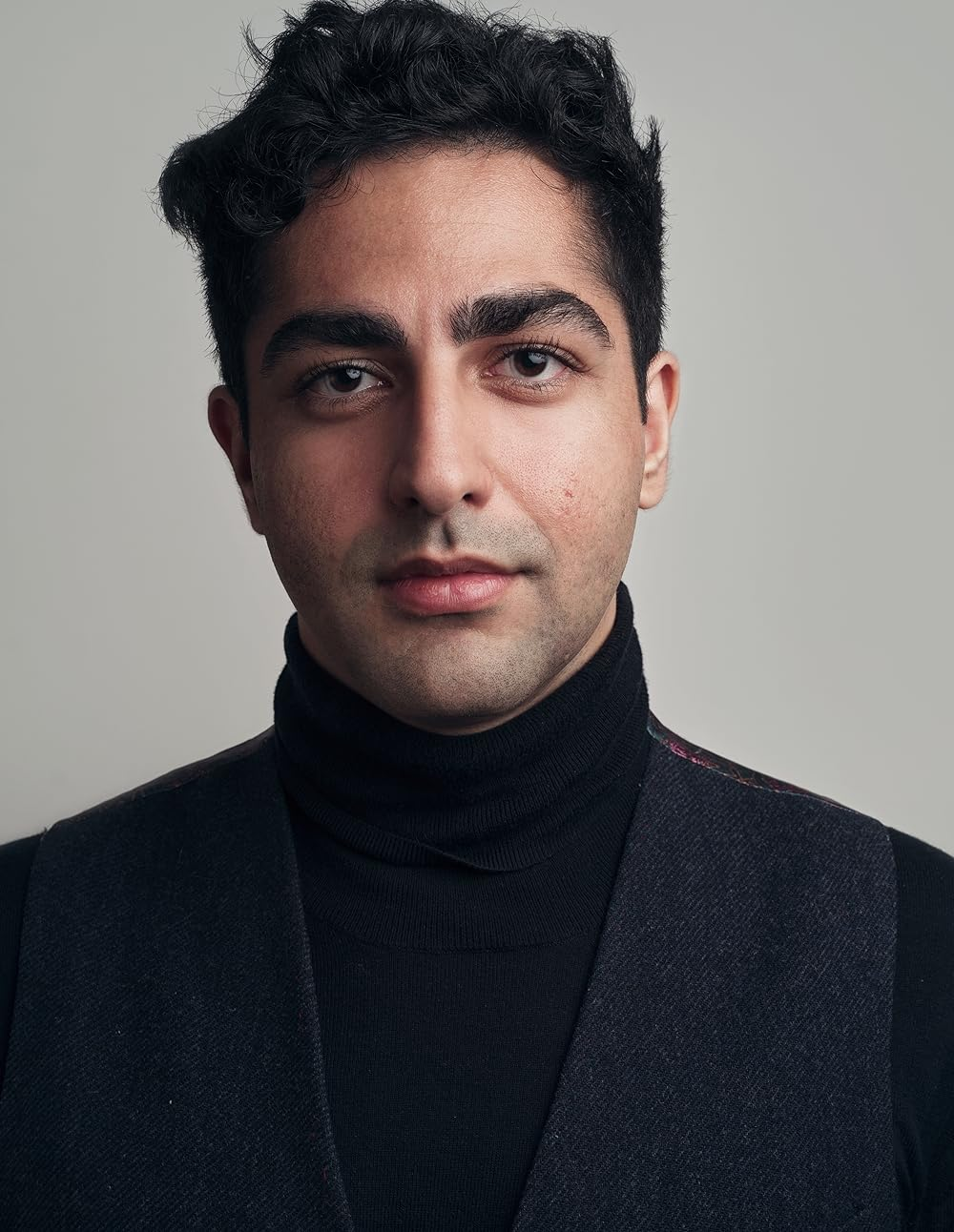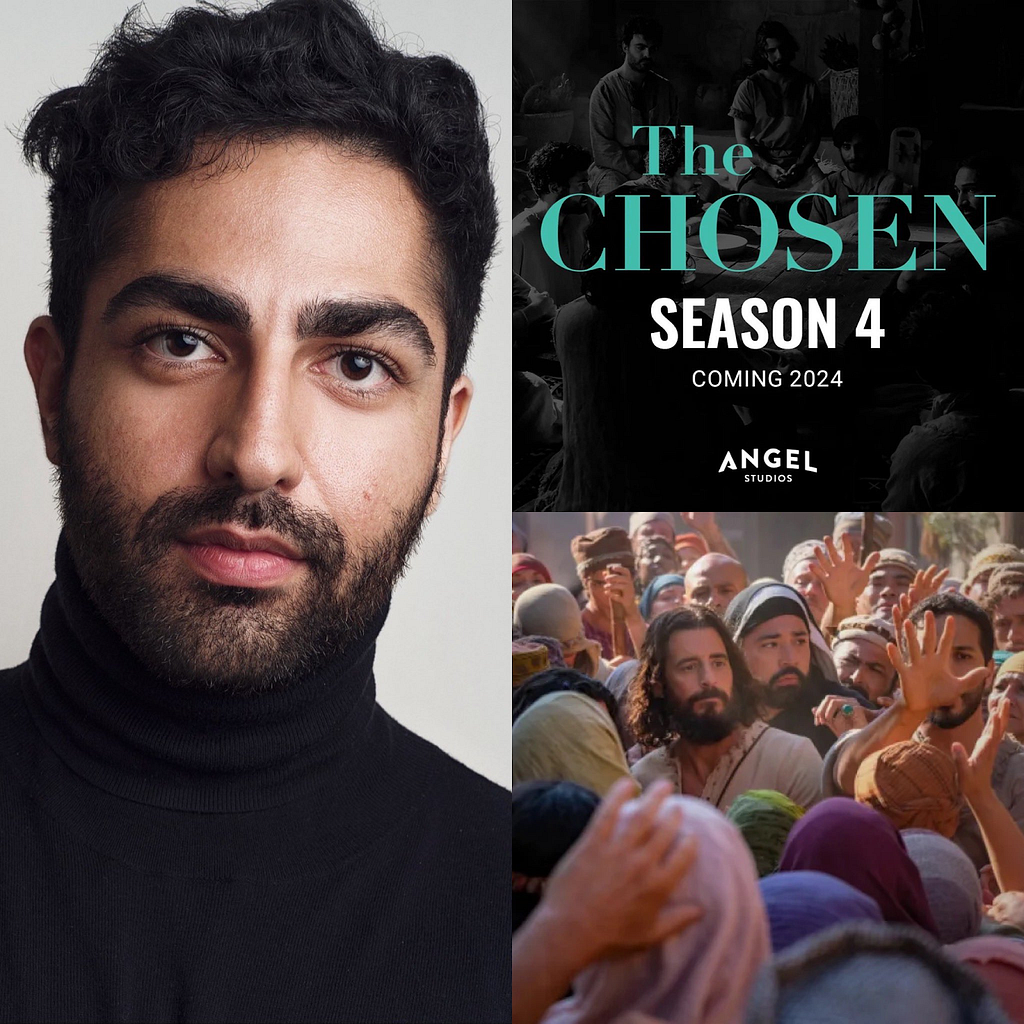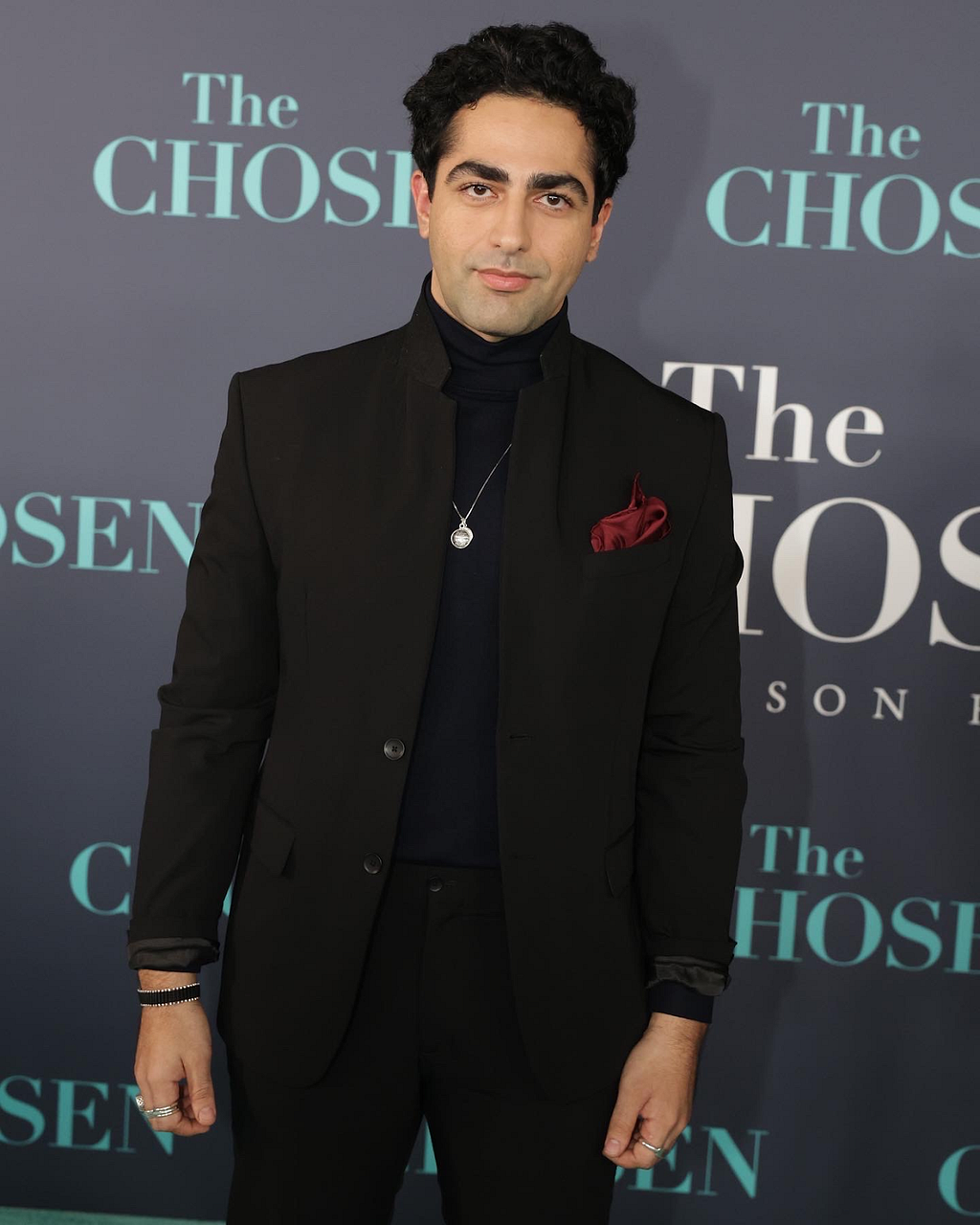
…I have this belief, through my studies and what life has taught me, that everyone has gone through trauma. There’s individual trauma, generational trauma, and collective trauma. I think if everyone could understand that we are all broken in one way or another and we’re all in pain, and then when we encounter something unknown or different, if we lead from a place of leaning towards pain rather than focusing on the symptom or the behavior, and lead with love rather than power, I suppose that would make a difference. If everyone took accountability for that and looked within before reacting, it would really make a difference, I think…
I had the pleasure to talk to Reza Diako. Reza is an English-Persian actor with Austrian nationality and Iranian heritage, has recently captivated audiences with his portrayal of ‘Apostle Philip’ in the fourth season of the globally acclaimed television series “The Chosen.” Born in Geneva, Switzerland, to Iranian parents — a painter and a businessman — Reza’s early life was marked by a series of international relocations. From Switzerland to Iran, then to Vienna, Austria, and finally settling in London, UK, Reza’s childhood was a tapestry of diverse cultures and languages. This rich background laid the foundation for his nuanced approach to acting and his choices in projects.
Reza’s academic journey is as eclectic as his cultural background. He pursued psychology at Queen Mary University of London, followed by a master’s in Mental Health Studies at King’s College London. His academic pursuits also included two years of medical school at the University of Bristol, where he studied Psychodynamic and Jungian Developmental Psychology. This deep dive into the human psyche has not only shaped his understanding of human nature but also informs the complexity and depth he brings to his characters.
Despite an initial career path aimed towards medicine, Reza’s artistic inclinations — fueled by a childhood immersed in art, music, and literature — led him to the world of acting. His formal acting training spans across various prestigious institutions in London and New York, including the Identity School of Acting, the Giles Foreman Centre for Acting, and the Stella Adler Studio of Acting. Since his transition into acting, Reza has showcased his versatility across a range of roles, from independent theatre productions to mainstream TV and film projects.
Reza’s filmography includes significant roles in productions that have gained international recognition. Before his role in “The Chosen,” he was seen in Sundance’s 2023 Audience Award and Best Screenwriter Award-winning film “The Persian Version,” Apple TV’s Original International Emmy Award-winning drama “Tehran,” and the Netflix drama “The Diplomat.” His upcoming projects include starring roles in “The Astronaut” and the film adaptation of “Reading Lolita in Tehran,” promising to further cement his position in the global cinematic landscape.
Beyond his professional achievements, Reza is deeply committed to philanthropy, particularly in the areas of mental health and supporting young people with autism. His vision to open a therapy center for children and young people underscores his dedication to leveraging his platform for societal benefit. Reza’s life story, marked by migrations, academic pursuits, and a career shift from medicine to acting, is a testament to his resilience, adaptability, and commitment to making a meaningful impact through his art and advocacy.
In an era where representation and diversity are increasingly recognized as vital to the fabric of storytelling, Reza Diako stands out not only for his compelling performances but also for his dedication to bringing authentic and diverse narratives to the forefront of Hollywood. His journey from a globe-trotting childhood through academic rigor to the silver screen encapsulates a quest for understanding the human condition, a theme that resonates deeply in his roles and personal philosophy.
Yitzi: Reza, it’s a delight and an honor to meet you. Before we dive in, our readers would love to learn about your personal origin story. Can you share this story of your childhood and how you grew up?
Reza: My origin? Wow. Well, it’s quite a complex and lengthy story, I suppose. I was born in Switzerland, in a small city called Geneva. I spent the first five years of my life there. Having Persian origins, I spoke Farsi at home but quickly picked up English. Essentially, I learned English and Farsi simultaneously. This led to me moving to Iran, where I completed my primary education from the age of five to eleven. Then, I moved to Vienna, Austria, for three years before settling in London, where I spent the last fifteen years. Over the past couple of years, I’ve been fortunate enough to travel the world for various jobs.
Yitzi: Can you share the story of what brought you to this path as a successful actor? How did that start? What was the transition?
Reza: Of course. That’s very kind of you to say. I think it was quite serendipitous because I was on a very different path. I’ve always dreamed of setting up a psychotherapy center for young people. Across the ten schools I visited during my travels, I noticed a common thread: the knots and traumas people carry. I envisioned creating a space to untangle these and offer unstigmatized, readily available support. So, I pursued this vision, studying psychology extensively and earning a master’s in the field, all in London. I even attended medical school for a couple of years aiming to become a psychiatrist.
Then, quite miraculously, my journey took a turn that felt guided by something spiritual or divine, leading me to acting. I had to pause my medical studies, and during that period, I engaged deeply with art, something I’ve done since childhood. My mother was a painter, and I grew up drawing, writing poetry, playing the piano from the age of nine, and composing music. Though I took acting classes more for personal development and psychological exploration, I loved it and participated in plays throughout my school years.
Interestingly, during my break from medical school, I auditioned for drama schools and got in. After graduating, I landed a role in the Tehran series directed by Dan Sirkin, a lovely guy. The series did incredibly well, telling a fascinating story about love between supposed political enemies. From there, things just took off. I’ve been very fortunate, benefiting from both hard work and a bit of luck. There’s a whole team behind my success, and it feels like everything was just perfectly aligned.
Yitzi: Unbelievable. So you probably have so many fascinating stories from your very fascinating career. Can you share one or two of the most memorable, most interesting stories that you can recall?
Reza: That’s an interesting question. It’s broad, but let me share. One memorable experience was the chance to work on “Reading Lolita in Tehran,” a project that’s about to be released. It was an honor to be selected to work with the director, Aaron Rickles, who is a legend. I admire his work, and collaborating with a team of young, up-and-coming Iranians was very unique. This project allowed me to honor an era before my time, the early 1980s with the Iranian Revolution and the closing down of universities. Hearing stories from my mother, who experienced these events firsthand, made it quite surreal. Working with Aaron, an amazingly generous and loving director, and Koshifteh Farhani, was incredible. I remember thinking after drama school in 2019 that working with Koshifteh would be a dream, perhaps when I’m 50. Yet, there I was, sharing very interesting and emotional scenes with her.
Another story is more humorous, related to my time on “The Chosen” playing Philip. I wanted to immerse myself in the wilderness, despite my deep fear of it. This led to some adventurous experiences, like becoming known as the guy who could sleep anywhere on set, even where scorpions roamed. I also recall a hike where a snake stopped me in my tracks, leaving me terrified. Additionally, I nearly fainted on set because I refused to use umbrellas for shade, insisting that Philip would be used to the sun. That decision taught me to not reject the umbrellas anymore. But it was all worth a try.

Yitzi: Is there a person who made a profound impact on your professional life?
Reza: That’s a really sweet question. First of all, I have to say that without my team of agents and management, it’s impossible. This work is a collaborative effort. Acting is a co-created, collaborative journey at every front, and I wholeheartedly believe that. When you’re on set, it’s the moments in between that matter. I always say God and art exist in the in-between. It’s not something that I alone bring. So, every person who has contributed to that has played a part. Maybe it’s a curveball, but I’m an advocate for psychology and therapy. I practice Jungian analytical therapy, and I’d give credit to my therapist. Both personally and professionally, it’s challenging to travel around and maintain your sense of self. Having the opportunity to be supported and explore the dark corners of yourself as an actor, who really wants to reveal the truths of human struggle, has been a significant part of my journey. It’s about getting comfortable with the taboos, the unspoken, the parts we say, “that’s not me.” Once you open those doors viscerally through feelings, through engagement in a safe therapy room, it has been quite helpful for my own approach. It’s helped me navigate through various levels of human experience with fluidity and flow. It’s an amazing journey, though I wouldn’t call it a story. My therapist would probably have more stories to tell. I’ve given him a lot of tough times, but he’s been very kind and loving in return.
Yitzi: You’ve been very blessed to be part of The Chosen, which is a global phenomenon. I have been very blessed to interview several of the cast members. By the way, you all have a common denominator. You’re all soft-spoken, humble, extremely smart. How would you describe how you are similar to Philip, the character you play, and how are you different from him?
Reza: Yeah, that’s a very good question. I’ll try to keep it as brief as I can. The similarity I’ve always felt, even when the original Philip came in season two, because I’ve been a fan, is that he’s known as the sort of esoteric nomad who’s been around the unknowns. In the frame of The Chosen, it sort of links to this person who’s gone to uncomfortable places and left home a lot, and is used to moving towards deeper things like values rather than saying, “I’m from here or there.” He’s quite comfortable being the weirdo and the outcast, which brings in a sense of ease with which he moves. I think he’s also very heart-driven. He’s the heartbeat of the group, the lover of the group. While some people are more like the warriors, others may be the magicians or intellectuals, I think he’s the heart and he bleeds and feels everything the group feels. His mission is probably to keep the herd together as they go through their journey. So, that’s sort of similar because I tend to feel that way, being psychologically oriented and such.
The differences are significant, though. For instance, I would not happily go outside and camp unless I’m doing it for a loved one. Practically, I’m not very adept. I get lost very easily and don’t know how to do basic practical stuff. If this computer crashes, we wouldn’t be talking for the next year. Anything that is hands-on, I’m a nightmare. There’s a scene this season where I’m putting a pomegranate together, and it took about a day’s worth of practice, YouTube videos, and all sorts of preparation to get there.

Yitzi: So, Reza, because of the platform you’ve built and your incredible work, you’re a person of great influence. If you could spread an idea or inspire a movement that would bring the most amount of good to the most amount of people, what would that be?
Reza: Well, I have this belief, through my studies and what life has taught me, that everyone has gone through trauma. There’s individual trauma, generational trauma, and collective trauma. I think if everyone could understand that we are all broken in one way or another and we’re all in pain, and then when we encounter something unknown or different, if we lead from a place of leaning towards pain rather than focusing on the symptom or the behavior, and lead with love rather than power, I suppose that would make a difference. If everyone took accountability for that and looked within before reacting, it would really make a difference, I think.
Yitzi: Such a brilliant answer. I really hope we can do a follow-up maybe in a few months or another year. But I wish you continued success and blessings. And yeah, I see you’re a rising star.
Reza: Very kind, and it’s been a pleasure. Thank you for your wonderful spirit. And yeah, looking forward to talking. I’m here anytime.
Yitzi: Okay, wonderful, Reza. Have a beautiful day, my friend.
Reza Diako Of ‘The Chosen’ On What It Takes To Create A Highly Successful Career In TV & Film was originally published in Authority Magazine on Medium, where people are continuing the conversation by highlighting and responding to this story.